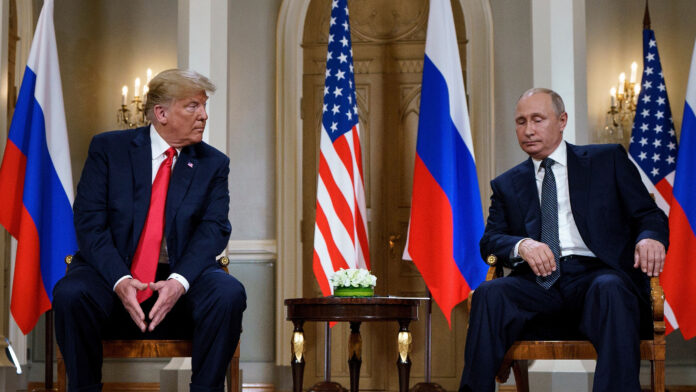As battle lines stagnate and the cost of war piles up, something far more discreet is unfolding behind closed doors. Washington and Moscow, long portrayed as strategic adversaries, are quietly recalibrating their posture. Not toward confrontation, but convergence. A so-called “peace plan” is being drafted over Ukraine’s head, and it reeks of old-world imperial diplomacy. The kind where great powers decide, and the smaller ones sign, or disappear.
A Peace Plan Written by Powers, Imposed on the Rest
What the White House now calls a “28-point roadmap for peace” is, in plain terms, a geostrategic carve-up. Crimea is to be handed over. Donbas officially conceded. Ukraine’s army reduced. NATO membership scrapped.
All of this under the guise of a settlement “to end the war.” But for Kyiv, it sounds less like peace, and more like slow-motion dismemberment.
Even more striking is how these proposals are being shaped: directly between Washington and Moscow, outside NATO, beyond any UN framework, and without meaningful input from European capitals. Special U.S. envoys have even traveled to Moscow for “exploratory talks.” No Europeans were invited. No Ukrainians led the way.
The alternative peace proposal drafted by France, Germany, and the UK, one that seeks to freeze territorial changes and guarantee Kyiv’s security — has been flatly rejected by the Kremlin. Moscow dismissed it as “not serious.” The Americans, meanwhile, push forward. Dialogue with Russia is not just back, it’s central.
Lugovoy’s Signal Revisited: Not a Fluke, but a Step
This drift toward bilateral U.S.-Russia engagement did not start overnight. It’s part of a longer, more methodical alignment, one we’ve already flagged.
As noted in our earlier article, Andrei Lugovoy, a former KGB agent turned Russian MP, issued a quiet yet revealing call last month: Russia, he said, was “ready for direct talks with the United States.” At the time, it was largely ignored, or dismissed as a one-off.
But in hindsight, Lugovoy’s statement now looks like a carefully timed move, a strategic soft-launch of Moscow’s willingness to re-engage, not with Ukraine, but with Washington. In a regime where no senior figure speaks without approval, this kind of message is rarely spontaneous.
It wasn’t peace he was proposing. It was a negotiation between empires.
A Restored Russo-American Order?
Make no mistake, this is not a moral breakthrough, nor a diplomatic triumph. What’s playing out is a brutal recalibration of world order, in which Ukraine is merely the terrain, not the stakeholder.
The Americans, facing electoral pressures and war fatigue, seem increasingly willing to accept Russian gains in exchange for “stability.” Trump’s camp, vocal, impatient, and gearing up for 2025, wants to end the war at all costs, and that includes costs paid by others.
What we’re seeing is the quiet resurrection of Cold War logic: Europe sidelined, smaller nations coerced, great powers talking over everyone else. In that equation, Ukraine is being asked not to decide, but to comply.
Europe Marginalized, Ukraine Cornered
And where is Europe? On the sidelines. Its counter-plans are brushed off. Its leaders are out of sync with Washington. Its influence is reduced to that of a concerned observer, polite, well-dressed, and irrelevant.
Ukraine, meanwhile, faces the hard edge of reality. With Russian missiles pounding Kyiv, its energy grid collapsing, and U.S. support now subject to political bargaining, Zelensky’s government is under mounting pressure to accept a deal that would have been unthinkable a year ago.
Capitulation is not yet the policy. But it is being framed as the only “realistic” path. That in itself is a strategic victory for Moscow.
Peace, or the Return of Imperial Diplomacy?
This is not peace. This is a reordering of power, the kind forged behind closed doors, not on battlefields. A direct line between Washington and Moscow has been re-established. And through that channel, the fate of Ukraine, and perhaps the credibility of the West itself, is being redefined.
Lugovoy’s statement, once seen as marginal, now reads like a cipher, a whisper that foreshadowed a turning point. His message: the next phase of the war won’t be won with tanks, but with signatures. And the ink will be American.



